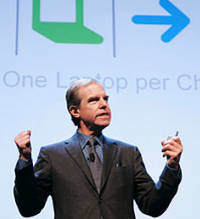In Defense of the Laptop
Reading Alanna Shaikh’s writeup on the OLPC Program as a failure in the UNDispatch and clicking through to Timothy Ogden’s harsh commentary, I began to feel a bit defensive for OLPC. I know, it’s a bit out of character, but not really.
Perhaps this is because SJ reminded me of some of the core good things that remain part of OLPC during his talk at the OLPC Learning Club / HacDC.org seminar Tuesday night. SJ went off on tangents on the value of open hardware in society, and the simple concept for learners when they realize that they have complete ownership and ability to open up and modify not only the tools inside the apps on the OLPC laptop, but the code that creates the tools, the code that is the operating system underneath those tools, and the hardware itself that the OS is running on top of. This is empowering and fundamentally and importantly different from a Microsoft environment, where everything is closed and locked down once you try to step outside the walled gardens. That is important. I do believe learning should be supported more by open/free software and concepts, and buffered against intellectual property and copyright restrictions.
SJ’s stories from Uruguay’s CEIBAL project and other Latin American deployments were heart-warming and promising, with “non technical” presentations about making videos (…by using programming tools in Squeak), and a variety of comfort levels with youth toying with the laptops. I left with an overall sense that the OLPC XO is helping expand the hackosphere of people engaged with technology, and not simply being users of technology.
Now, I’ve had my fair share of problems with the OLPC project from day one. I thought it was bordering on immoral to force countries into buying them in lots of one million, almost guaranteeing a budget disaster and an implementation nightmare, with teachers feeling that the laptops were being forced on them and sitting, covered in dust, in storage rooms.
I think the confusing messaging that’s come from OLPC leadership (is it a laptop project or an education project? Does it cost $100? $50? $205? Is it a trojan horse sneaking open source into the classroom in the guise of an ebook? Is Sugar the best thing since sliced bread or OLPC’s biggest mistake?) The list of contradictory comments goes on for a very long time.
At the beginning of 2009, we saw OLPC lay off half of its employees coming after the painful split between Negroponte and Bender in mid-2008. Parallels were drawn to Negroponte’s earlier failure with Apple computers in Senegal in the 80s.
I actually think that the problems OLPC is facing is creating a better actual process, as seen in the wider community providing increasingly large support for things like curricula development and technical manuals, and with things like the OLPCCorps semi-grassroots projects and the revamped Contributors Program that grants small numbers of laptops to seed community projects. Projects like these create a groundswell for sustainability, enable the creation and sharing of locally-relevant content, and help reveal real-world constraints in the real cost of the program.
Now, perhaps they should have tried this more natural diffusion process through seed projects and change agents from the beginning, instead of pushing for huge, million-laptops-plus orders. Whether OLPC will host a new G1G1 this holiday season with the new hardware is currently in doubt, and I don’t see them dropping education or opening the XO up for base of the pyramid projects or the open market anytime soon, but I feel that we may be at least approaching a key turning-point in the lifespan of OLPC.
Alanna says that “The dream is over” - I think the nightmares are over; the real long-term and more sustainable dream may be just beginning.



